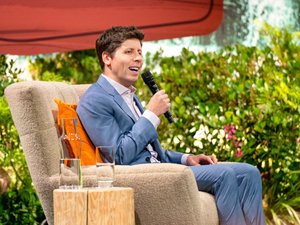
A business incubator in Baltimore is looking to put its city on the map when it comes to the tech industry.
Hutch was established last year as an incubator to grow Baltimore-based startups looking to do work in the civic technology space. The program exists within Fearless, a government digital services consultancy led by founder and CEO Delali Dzirasa. Dzirasa said the program was born out of a sense that there’s a dearth of small tech companies that not only seek to scale and profit, but also meaningfully tackle civic problems.
“Our vision [at Fearless] is really seeing a world where good software powers things that matter,” Dzirasa said. “This world that we envision, where we've got good tech powering all these really cool things like education and health care and social justice issues – there just wasn't enough really competent tech companies that are in that space that wanted to focus there.”
Hutch’s mission is specific to Baltimore, where Dzirasa says too many barriers to entry have prevented would-be entrepreneurs from entering the tech space. For example, a study released last month by the Abell Foundation found that about 40 percent of households in Baltimore lacked a wired internet connection.
“If you're trying to recruit for a tech company, what a huge disadvantage it is if someone can't even get online,” Dzirasa said.
To that end Dzirasa says Hutch “will hold their hand” as the founders figure out everything from the foundation of their business to designing a custom business model. Since Hutch focuses on civic tech and digital services for the public sector, there are a lot of arcane and cumbersome processes the founders must navigate through in order to win clients, like understanding and responding to an RFP or dealing with a teaming agreement.
“We do have a large purchaser right down the road in the federal government that pays its bills on time and buys just about everything that you could imagine,” Dzirasa said. “It's a highly regulated environment and it can be super tough breaking and to understand all the policies and the rules, but also some of the most rewarding and some of the most exciting work that I think one could do in the civic technology space.”
Hutch, like so many other operations, has gone remote in response to the Covid-19 crisis. With the remote-work culture spurred by the pandemic, Dzirasa said there could be an opportunity for firms to seek opportunity outside of traditional tech hubs where talent and capital historically have been concentrated.
“I personally think talent is everywhere, in every city in this country. They aren’t hidden gems. They're just gems that no one's looking for. And so I think part of the responsibility becomes: how do they get out front and get into these markets that people maybe aren't looking in.”
Diversifying talent is especially salient now, as recent protests in hundreds of cities sparked by the killing of George Floyd have invigorated the conversation about race and inclusion in all contexts, including the workplace. The movement has prompted companies far and wide to make commitments to diversity and anti-racism. Dzirasa says time will tell which ones are genuine and which ones are simply paying lip service.
“If you're not putting out a statement right now, the internet will come get you,” he said. “And so I think the proof will be in the pudding, when we look six months or a year from now, like who was really serious about how they've made investments.”
As for the companies in Hutch, Dzirasa says the kind of awareness it takes for a business to survive and thrive in such a turbulent time has always been embedded in the program.
“Everything about taking advantage of opportunities and being able to pivot quickly are things that we've talked about since day one,” he said. “This program, being based on civic tech and social innovation, it is baked into the DNA of this program."
Hutch is currently coaching 13 companies, which are working on a wide range of tech services, including data science, user experience, cloud solutions and agile project management, among other things. The incubator plans to open applications for its next cohort later this summer. While the focus is currently fixed on Baltimore, Dzirasa said the hope is to expand it to Montgomery, Alabama, the other market where Fearless operates.
“There's talent everywhere and these folks are some of the brightest people that you will ever meet. So people that aren't looking, they're doing themselves a huge disservice,” Dzirasa said. “But I will keep hunting and I will keep finding these founders and providing them with opportunities.”







